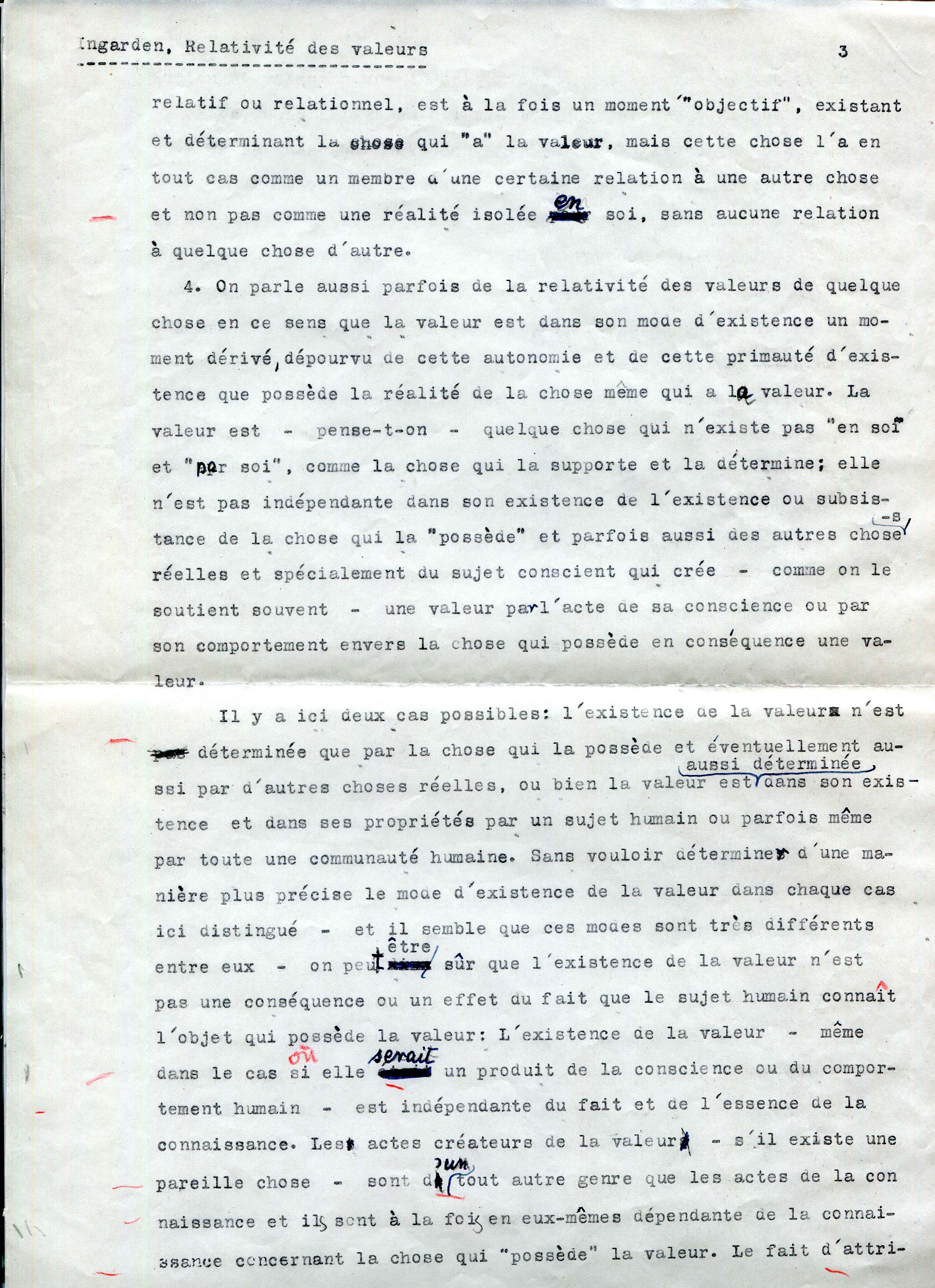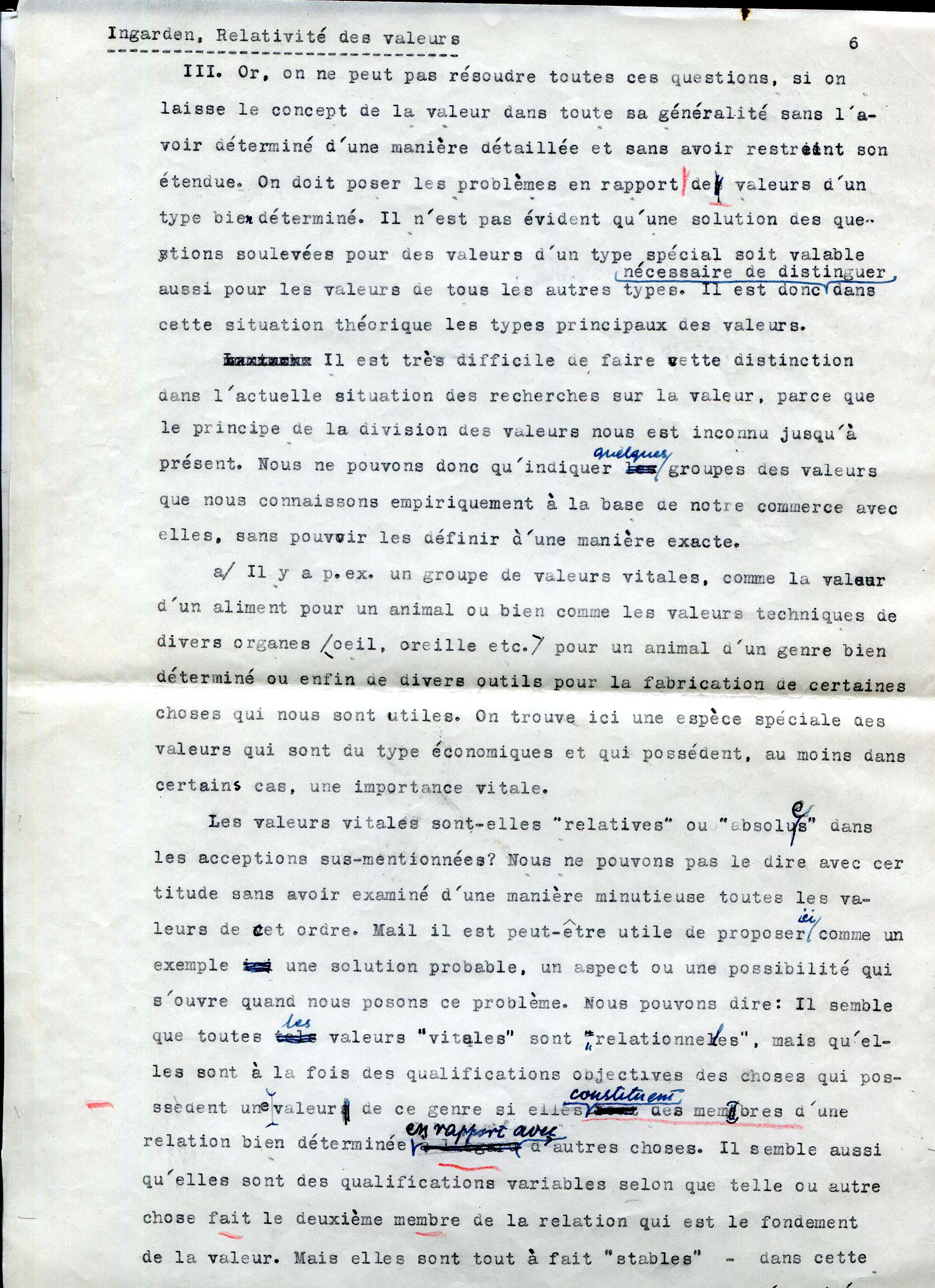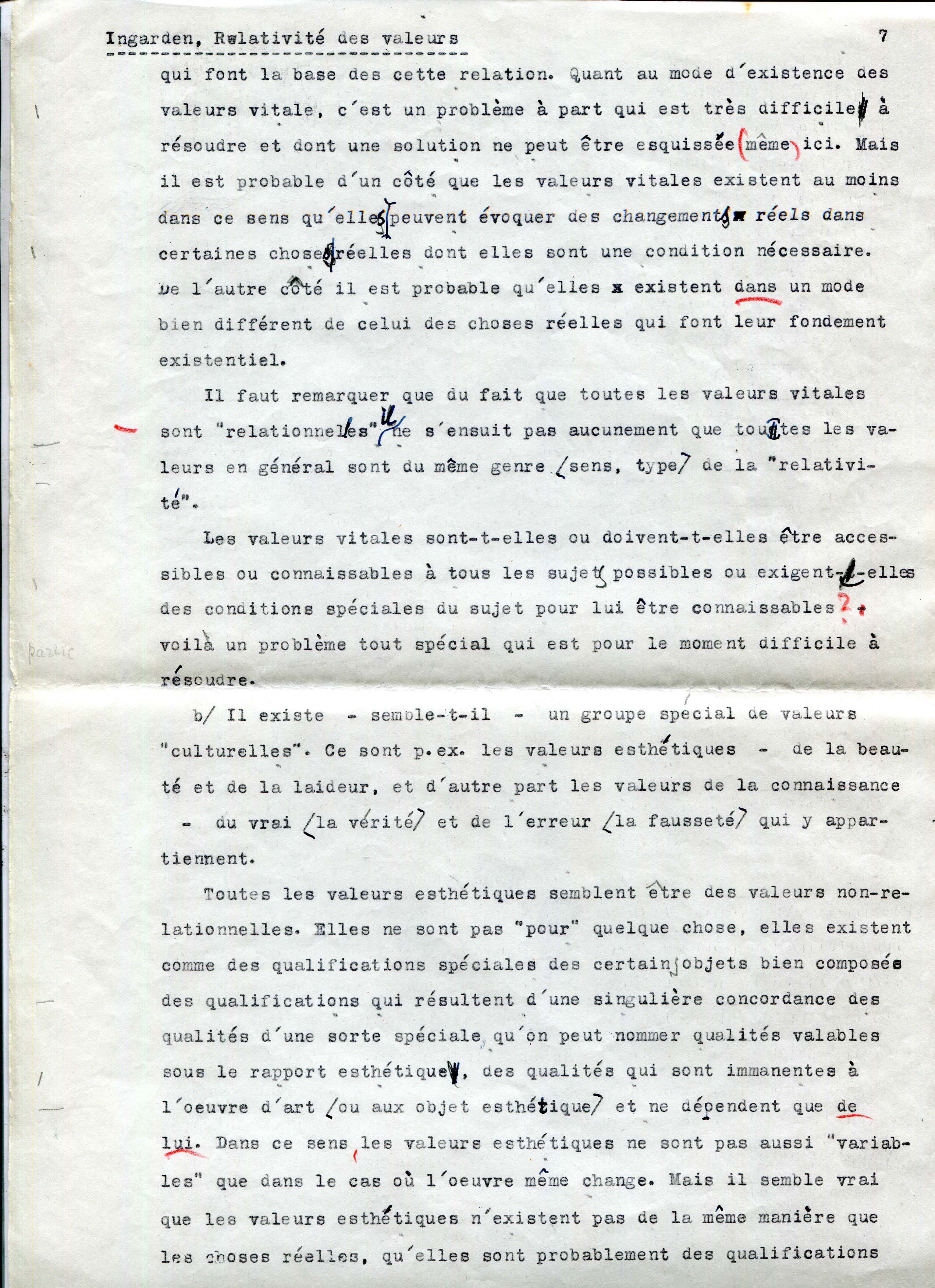







Lecture of Roman Ingarden in Brussels nd.nd.1947
ROMAN INGARDEN
Professor of the Jagiellonian University
in Krakow. Poland
REMARKS CONCERNING THE RELATIVITY OF VALUES
———————————————————————————————————–
The old and dangerous problem of relativity of values depends on several theoretical and practical attitudes, which are usually hidden. In our attempts at a deeper discussion of this problem, we should proceed with caution and reveal solutions to issues posed in a general manner, without a conscious and specific discussion.
There are three significant concerns in this regard: Firstly, the meaning of relativity, secondly, the difference between particular varieties, or types of values, and thirdly, the question whether we should consider the issue of relativity of value generally or, on the contrary, address this problem separately for each type of value.
- In discussion, relativity – especially the relativity of values – is usually referred to in several different meanings, which, however, have never been clearly distinguished from one another, and none of which has been clearly defined.
- The first meaning is epistemological and existential to some extent. It is said, for example, that a certain value /beauty of an image or a woman/ is “relative” because we believe that we perceive a beautiful image, but we are, in fact, wrong, assigning a value, such as beauty, to the image. This is a unique illusion that deceives us when an image /or a woman/ seems beautiful or when a dish seems tasty. In reality – as we are supposed to believe – these are attributes that do not exist, do not belong to the objects we assign them to. Of course, the point is not that we sometimes wrongly evaluate certain values, but that each case of valuation or indication is misleading: a peculiar fictitious phenomenon occurs – and that constitutes the value itself.
Whether it is a purely intellectual error of recognition or a specific illusion that takes place in a more or less sensory perception – this is a problem of no significance to us. Neither are any possible differences in the degree of the errors that occur in individual cases. It does not matter, therefore, if we deceive ourselves in an absolute way assigning the object in this case with something that is completely foreign to it, or if some objective basis for this attribution really exists. This is in no way critical for the meaning of relativity currently under our consideration.
- We speak of relativity of value /beauty of an image, generosity of a man, etc./ in a completely different sense when we assume that a single object can change “its” value depending on various circumstances, without the object possessing value itself having to be altered. For example, an image (e.g. Rafael) no longer has the same high value of uniqueness since the moment Rembrandt’s portraits appeared. The value of a car as the fastest and most convenient means of communication before the First World War has changed /decreased/ since we have introduced an airplane, which is faster and more convenient than a car.
This change in value – taking place regardless of no changes occurring in the object that possesses value – is one of the most unusual phenomena in the world of values. The value of an object exists objectively here and does not depend on our knowledge. Instead, it depends on the circumstances in which the valuable item is found. It is “relative” compared to the value of other objects, relative to them.
- We consider a completely different meaning of relativity of values when an object or a person has value for something or someone else. For example, some food has value for a certain type of animals and has no value, or different value for another type of animals. The value “in and of itself”, in its essence – or, if we prefer to put it this way, in its sense – entails a special relativity…
[missing fragment]
… relative or relational, it is both an “objective”, existing and defining moment for an object that “possesses value”, but for another object and not as an isolated reality in and of itself – it is without any relation to anything else.
- Sometimes, the debate on the relativity of values of something refers to the existence of value as a derivative of a moment, deprived of the autonomy and primacy of existence that the reality of the object possessing value has. Value is – one might think – something that does not exist “in itself” and “of itself” as a thing that preserves and determines it: it is not independent in its existence from the existence of the object that “possesses it”, but sometimes also of other real objects, especially the conscious subject, who – as is often maintained – creates value through the act of consciousness or by their way of behavior towards a certain object which is consequently endowed with value. Two possibilities should be pointed to here: the existence of a value is determined only by the object that possesses it, and perhaps also by other objects from its surroundings, or this value is also determined in its existence and properties by a human subject, and sometimes even by an entire human community.
Foregoing attempts at a more precise definition of the world of existence of values in each case discussed here – and it seems that the methods differ significantly from each other – we can be sure that the existence of value is not a consequence or effect of the fact that a human subject cognizes an object that has value: the existence value – even if it was a product of human consciousness or human behavior – is independent of the existence and essence of knowledge. Acts that create values – if anything else like them exists – are of a different nature than cognitive acts and are in their very essence dependent on knowledge regarding the object that “possesses” value. The fact of assigning value to an object is not a mistake or an illusion then, but it is contingent on objective knowledge of the object that has value and the value itself.
- It seems that we should distinguish another well-defined type of “relativity” of values, which is usually partly confused with “relativity” in the epistemological sense of the word, and partly with relational “relativity” of value. We are thinking here of values that are available only to specific entities, and not to all possible entities. An entity that wants to experience and commune with these values must meet well-defined conditions that are not universally available to all entities without distinction. As a consequence of different points of view, according to which we are accustomed to adopting theory of knowledge, we tend to believe that these values are “relational”, because they practically do not exist /or rather: they are not given/, except for certain types of entities; it is also believed that they create a strange and peculiar illusion for some of our manners of perception or certain types of our consciousness and our conscious interaction with certain objects of the world, belonging to our particular environment. It is true that the fact that a certain value is given only to an object of a certain kind does not mean that it does not exist in itself as a specific qualification of the object which possesses it, nor that it ia something relational in the discussed sense. For example, the beauty of a musical work is only perceptible to a listener who can listen to it and who is able to aptly define aesthetic emotions as a reaction to a given work. This emotion is like a key that opens the way to the work itself, in all its aesthetic qualities, and enables its immediate understanding by the subject. However, beauty, aesthetic charm, specific compatibility of aesthetically available qualities, etc. – are all special features that are not in themselves ‘relational’ to something or someone.
- It cannot be excluded that there are other meanings of relativity of values, but the aforementioned ones are the most common, and it is enough to distinguish these here. Several different types of “relativities” of values defined here may sometimes seem to appear in a single case at once. But it does not seem necessary to consider this matter. Of course, every meaning of “relativity” of values has its opposite. These opposites differ the same way the “relativities” themselves do. And if we want to consider the issue of “relativity” of values, we must formulate it in five different ways:
- Is value just a simple illusion arising from our erroneous way of cognizing it /or the object possessing it/ or a real and unique being /quality/ that we can find in some parts of the world around us?
- Is value just a single qualification of certain objects that differs depending on changes in circumstances in which objects possessing value exist, but not in the objects themselves? – or is value a constant quality in all circumstances dependent only on the properties of the object that possesses value?
- Is the value of the object given to us, in a sense, for direct interaction the essence or relational quality of this object and does it simultaneously exists for another object, or is it – on the contrary – “absolutely”, non-relational, without /any/ qualitative relation to any other object?
- How do values exist? Is the existence of value a somewhat “relative” existence, for example a derivative and dependent on the existence of another object, in particular the existence and behavior of the human subject which perceives the value /or the object that possesses it/ – or is the existence of value “real” in the same way as the existence of the object that possesses it?
- Is value, in its essence, such that it is available and cognizable to all possible subjects, or must the subject which can perceive it, cognize it and physically interact with it …?
[missing fragment]
III. We cannot solve all these issues if we leave the concept of value at a general level without defining it in more detail, without limiting its scope. One has to ask about particular types of values. It is not a given that answer to questions about value of a specific type will also be valid for values of all other types. Therefore, it is necessary in this theoretical situation to distinguish some main types of values.
a/ There is, for example, a group of important values, such as the value of food for an animal or the value of performance of various organs /eyes, ears, etc./ for a specific animal of a certain type or, finally, various tools for producing certain things which are useful to us. We encounter a specific type of value here, which is of economic nature and which, at least in some cases, has particular significance.
Are vital values “relative” or “absolute” in the aforementioned acceptations? We cannot say so with certainty without carefully examining all values in this category. However, it may be useful to suggest here as an example a probable solution, aspect or possibility that open up when we pose this problem. We may say: it seems that all “life” values are “relational”, but that they are also objective qualifications of objects possessing this type of value if they are a party in a particular relationship in relation to other objects. The qualifications also seem to be variable depending on whether one or the other object makes the other party in the relationship become the foundation of the value. But they are quite “stable” – including …
[missing fragment]
… which form the basis of this relationship. As for the way vital values exist, it is a specific problem that is very difficult to solve and its resolution cannot be outlined here (even) at this point. But on the one hand, it is likely that vital values exist at least in the sense that they can cause real changes in certain real objects for which they are a necessary condition. On the other hand, it is likely that they exist in a manner very different from the existence of real things that constitute their existential foundations.
Since all significant values are “relational”, it should be noted that it does not mean that all values in general can be attributed the same kind /meaning, type/ of “relativity”.
Are or should vital values be available or cognizable for all possible subjects, or are there specific conditions a subject must fulfill for them to be cognizable? The nature of this problem is very specific and it would be difficult to solve at this point.
b / There seems to exist a special group of “cultural” values. These are, for example, aesthetic values – beauty and ugliness, and the values of knowledge – reality /truth/ and error /falsehood/.
All aesthetic values appear to be non-relational values. They are not something “for” something else, they exist as special qualifications of certain objects consisting of qualities which result from a single compatibility of features of a specific type, which we can call features significant in aesthetic relation, features which are immanent in works of art /or aesthetic objects/ and only dependent on them. In this sense, aesthetic values are not as “variable” as in the cases where the work itself changes. But it seems true that aesthetic values do not exist in the same way real objects do, that they are probably qualifications of intentional objects /and thus “relative” existence/, and that they are only perceptible to a subject whose perceptual abilities fulfill special conditions.
c/ To give one more example, “moral” /ethical/ values, of course, exist. Are they somehow relative? It is difficult to say, as it is not quite clear at this point, assuming they form a special group of values or are, for example, “fundamental” values, and in particular – values of basic utility. But it can already be said that if they constitute a special group of values that cannot be reduced to any other type of value – which seems probable to me – their relativity should be considered completely separately, we would, however, encounter a number of difficulties we have already pointed out before.
The most important problem here is, of course, the following question: is any “moral” value simply a strange illusion of our knowledge – or an objective qualification of certain human deeds or actions, respectively of the will or the person who is the subject responsible for conscious action? This does not exhaust the issues we could reflect on based on the distinctions outlined above, some of similar weight and significance as our central problem. They include the issue of the manner of existence of moral values, and the question whether moral values are “relational” [or] not. These are the three main issues the solution of which would make for a true advancement in value theory.
Roman Ingarden
